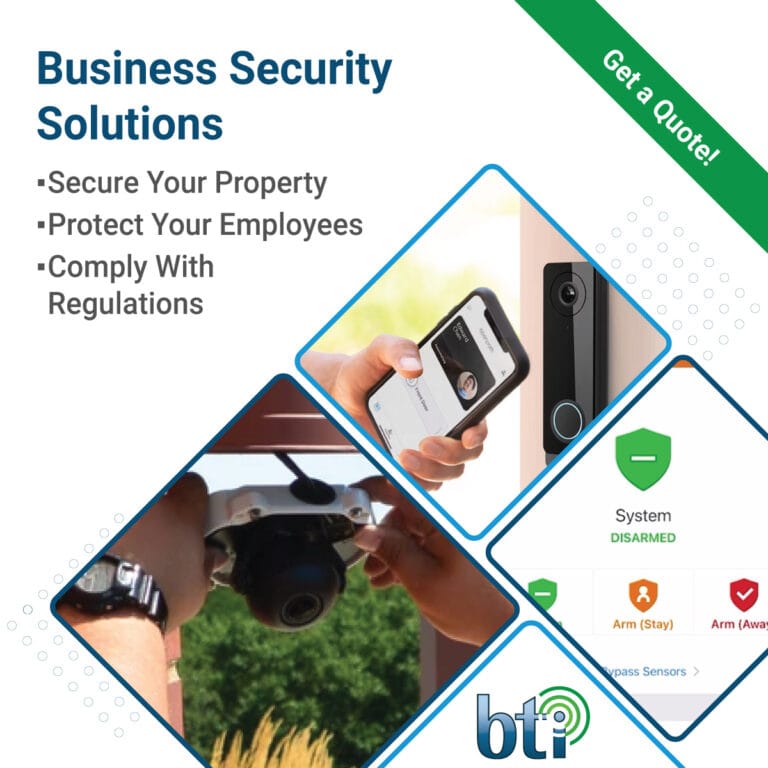What is a Security Systems Integrator?
A “security systems integrator” combines alerts, notifications, sensors, panels, Software, cameras, burglar alarm, access control, and analytics into a working system to protect customer facilities, intellectual property, and personnel. A “converged security integrator” goes one step further and integrates the sensors, analytics, and alerts from cybersecurity and network security devices into the solution for full vulnerability and situational prevention and response.
Most businesses invest in separate vendors and separate staff to manage physical and cyber security. Purchases and subscriptions include:
- Electronic security such as cameras, door and gate electronic access control, visitor management, burglar alarm and camera monitoring.
- IT security such as managed IT services, Software, cyber security, and compliance services and software.
Legally or contractually, most businesses are subject to contractual and legal liability for any gap in physical electronic or IT security. In most states and industries, regulations and compliance requirements overlap at the contractual, employer liability, state, federal, and International civil and criminal liability, and the resulting industry accreditation level.
Every piece of equipment and software comes with its technical instructions, benefits, and limitations. What works for a PC is different from what works for a server, a SAAS application, a camera, a firewall, a phone system, or an alarm or access control system. As of now, there is no one size fits all solution.
Enter BTI, the Security Systems Integrator: the behind-the-scenes team that integrates your security tech together. BTI combines IT infrastructure security with managed IT and cyber security solutions to create a best of breed, expert led, integrated and proactive defense against modern threats.
The role of an integrator is key to preventing loss and keeping your business operational.
What Does a Converged System Integrator Do?
Ever feel like your security tools aren’t really talking to each other? Cameras, firewalls, door access, sensors… all doing their own thing? That’s where a converged security systems integrator steps in.
Converged security systems integrators act as the bridge between your physical and digital security tools, bringing everything together into one functional, intelligent ecosystem. Their job isn’t just to install hardware and keep it operational; it’s to design and deploy systems that actually work together to reduce risk and enhance protection.
Key Roles and Responsibilities of Converged Security Integrators
• System Design & Planning: Integrators assess your physical infrastructure, network, and risk profile to design a customized solution.
• Technology Integration: think access control syncing with surveillance systems, access control, intrusion detection, and cybersecurity tools monitored by a team of experts that tend to know what each other is always doing rather than leaving holes uncovered.
• Vendor Coordination: Working across multiple technologies from different manufacturers and developers, they ensure compatibility and streamline deployment, so you don’t have to.
• Ongoing Support & Managed Security Services: They monitor and manage your systems (especially if you’re using a cybersecurity managed services provider like BTI).
Fun fact! Most companies juggle multiple disconnected systems; and spend 40% more time troubleshooting because of it. Integrators solve that with smarter setups and managed security solutions that work in sync.
Why Should You Hire a Converged Security System Integrator?
It’s no secret that security threats are more sophisticated than ever and managing a patchwork of disconnected systems just doesn’t cut it anymore. That’s where a security system integrator adds real value. According to IBM, the average data breach costs $4.45 million in 2023; and poor system coordination is often a contributing factor. An integrator helps you close the gaps before they’re exploited. Furthermore, The Hidden Crime Tax statistics show that few incidents of theft, fraud, or cyber are ever reported and even less are ever cleared.
Furthermore, The Hidden Crime Tax statistics show that few incidents of theft, fraud, or cyber are ever reported and even less are ever cleared.
Here’s why hiring an integrator matters:
- You’re less likely to be a victim
- You’ll identify and clear most every vulnerability proactively
- You’ll have the tools that HR, facilities, IT, and security need to clear any incident
- You’ll stop wasting time bouncing between vendors
- You’ll be able to attract and keep the best employees and customers by exceeding their security expectations and requirements
- Your team can start sleeping at night again.
And if you work with BTI, you’re not just getting an integrator, you’ll be getting a team that combines physical security, network infrastructure, and cybersecurity expertise for the same or less money than you’re probably already spending. That’s a rare combo in today’s market.
What Industries Can Benefit from Converged Security System Integration?
No matter what industry you’re in, your systems are probably more connected—and more vulnerable—than ever. Security integrators help close those gaps by creating customized solutions that protect your assets without adding complexity.
These are some of the industries that benefit most:
Healthcare – Provide a real environment of care for staff and patients in a Hippa and privacy compliant format.
Manufacturing – Protect valuable assets, avoid security and worker’s comp incidents, and drive productivity and efficiency.
Commercial Real Estate – Provide attractive and secure property to tenants with a high rate of occupany at lower insurance and maintenance costs than the industry average.
Education – Improve campus safety and staff and faculty productivity to reduce loss and improve enrollment and student housing occupancy.
Logistics & Distribution – Comply with customer requirements and regulations at the lowest possible cost with the highest incident protection.
That’s what security system integration delivers: cohesive, intelligent protection that scales with your needs.
Already have an integrator?
Learn how they can optimize your systems with proper integration.
Why Should You Hire a Converged Security System Integrator?
If your security setup has reached a point where it feels more like patchwork than a well-oiled machine, you’re not alone. Most businesses outgrow their original systems; but don’t always have the time or knowledge to make everything work together smoothly.
That’s where a security system integrator comes in.
BTI can help you:
- Monitor your systems (not just install them)
- Eliminate tech headaches
- Future-proof your infrastructure
- Free up your team to focus on what they do best
And here’s the kicker: integrated systems don’t just look better on paper; they perform better which drives operational efficiency and productivity.
Working with a partner like BTI means you’re not just getting integration; you’re getting physical security and safety solutions and expertise, IT and network infrastructure expertise, cybersecurity management, and long-term support at the best possible cost or value depending on your particular needs.
How To Choose a Converged Security Systems Integrator
Choosing the right security systems integrator isn’t just about who offers the best products; it’s about who understands your environment, industry, and technology from network infrastructure, SAAS applications, IOT, electronic security, and cyber risk mitigation. The right integrator can help you avoid gaps, reduce complexity, and reduce costs.
Here’s how to pick the right partner (and not regret it later):
Evaluate the Integrator’s Experience
Ask how long they’ve worked in your industry, not just how many installations they’ve done. BTI, for example, works with schools, healthcare, law enforcement, government, healthcare, logisitics, and small and medium business; we know how to build for both simplicity and scale.
Ask for Certifications, Case Studies, and References
Are they certified and experienced or just confident? Each piece of technology comes with its own technical certification, safety, and compliance requirements. Neither size nor focus guarantees a result – what matters is your needs, your technology, and the competency of the vendor in those specific areas.
Look for Project Expertise and Ongoing Pricing and Value Leverage as Well
Before hiring anyone to be your service company, ask yourself: How will this particular company help me get small and large projects done in the future? Technology is always changing and so are your requirements. Avoid vendor lock in arrangements where you can be overcharged or underserviced without the ability to make a change in your own interest.
The right vendor, like BTI, will be able to execute projects far less costly for a managed customer than any other competitor will ever match. Remember that you are investing in your vendor, not just your technology and you don’t want to waste your time or oxygen explaining requirements again to someone not listening or interested in you in the first place.
Confirm Support for Training and Ongoing System Optimization
It might sound surprising, but some companies install your system or give you the license keys and disappear—no training, no updates, no help if something breaks. That’s a big red flag. The right integrator should walk your team through how to use everything and be there for future updates, issues, changes, and integration.
BTI does just that. We don’t leave you hanging—we offer training, maintenance, and support from day one.
Verify Data Security and Compliance Measures
Most vendors specialize in one product or service. They don’t offer extended support for cyber, connected infrastructure or systems, or integration. When choosing a partner, ask how they handle cybersecurity, troubleshooting, patching, configuration, and management of connected technology. Most of the time, they don’t. BTI does.
Ask for Transparent Pricing and Clear Fixed Fee Scopes of Work
If the quote feels vague, that’s a red flag. A trustworthy integrator will provide clear, itemized pricing that compares favorably with what you find online on your own for every item or service. This level of transparency is your only assurance against being taken advantage of now and in the future. At BTI, we always outline what’s included so you know exactly what you’re paying for, and your itemized pricing doesn’t end after the first purchase.
How Will Their Managed Service Make your Life Easier
One of the best questions you can ask a potential integrator is: “How will you make this easier for us?” If their answer doesn’t go beyond basic installation, training, and support, keep looking. A smart integrator should be looking for ways to save your time, reduce costs, and make your experience good beyond your initial requirements in the future. At BTI, our goal is to simplify your operations—not add complexity. The right integrator should help you do more, with less. In one case, we saved a client $3,000,000.00 beyond their initial requirements with a simple integration that hadn’t been done or thought about before then.
Bridge the Gap Between your Physical and Cyber Defenses?
Talk to a BTI security expert today and discover how a converged security system can protect your people, data, and reputation.








